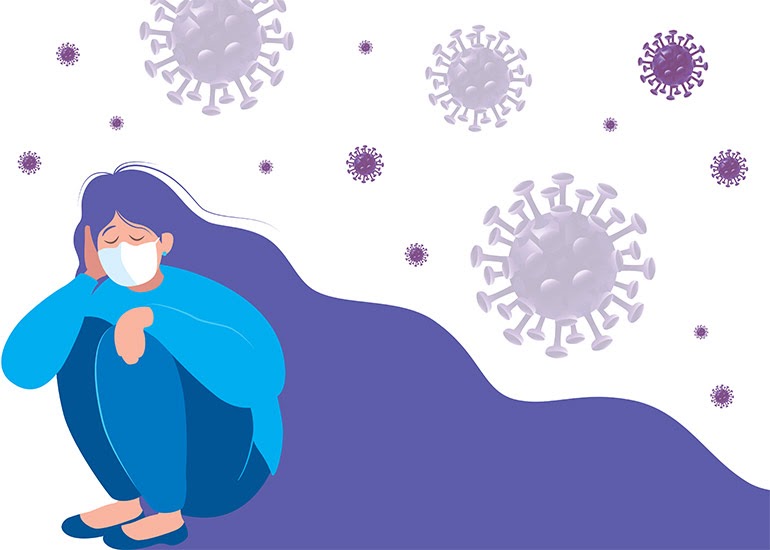Studies Show Link Between COVID-19 and Psychiatric Disorders

Image courtesy of Medicine at Michigan
By Margaret Adams
Oxford University recently released a study that found 20% of patients diagnosed with COVID-19 were then diagnosed with a psychiatric disorder within 3 months of their COVID-19 diagnosis. The same study also found that 25% of those patients had not been diagnosed with a psychiatric disorder before their COVID-19 diagnosis. This is the first study with large-scale evidence to support the existence of the link between COVID-19 and psychiatric disorders.
The study, which was released on November 9, 2020, used a global network that collects data from anonymous patient records called TriNetX Analytics Network. The researchers used data from 69.8 million patients over 54 healthcare organizations in the U.S.A.
“People have been worried that COVID-19 survivors will be at greater risk of mental health problems, and our findings in a large and detailed study show this to be likely,” said Paul Harrison, PhD, professor of Psychiatry at the University of Oxford and lead researcher.
“In 14 to 90 days after being diagnosed with COVID-19, 5.8% of patients received a first recorded diagnosis of psychiatric illness… The risk was greatest for anxiety disorders, depression, and insomnia,” according to an article written by Megan Brooks,
The same study also suggests that people suffering with mental disorders are 65% more susceptible to COVID-19, which is further investigated in a more recent study.
The reasons for the link between COVID-19 and psychiatric disorders are not explicit, but many studies show where the possible links occur.
With quarantining being naturally isolating, much research shows that loneliness leads to depression and many other health problems.
Kassandra Alcaraz, PhD, MPH, led a 2019 study in which the results suggest that social isolation increases the chance of premature death for every race.
“Our research really shows that the magnitude of risk presented by social isolation is very similar in magnitude to that of obesity, smoking, lack of access to care and physical inactivity,” Alcaraz said.
Another possible reason for the link between COVID-19 and psychiatric disorders may be the economic stressor that has also been a result of quarantine. Research suggests that a low socioeconomic status is linked to a higher prevalence of depression. Between March and April of last year, about 30 million people filed for employment for the first time. With millions of households across the U.S. lacking income, economic pressures have become extremely prevalent.
The neurological effects of COVID-19 also show a strong link to mental disorders. In the most severe cases, the most common neurological issues COVID-19 patients have experienced are stroke and delirium.
Majid Fotuhi, MD, PhD, lead author of comprehensive review of COVID-19’s effects on the nervous system, explained that 30%-50% of hospitalized patients will experience neurological effects. In many mild cases, people will experience fatigue and “brain fog,” as well as unusual taste or smell that lingers for months. Research suggests that delirium is associated with depression and anxiety, which implies a direct link between COVID-19 and mental illness.
Early research on links between COVID-19 and psychiatric disorders show the imminent need for mental health awareness and focus on mental health care during this time of psychological hardship for all people, especially college students.
“I mean I was doing online classes cooped up at home and now I’m doing online classes cooped up at school. But at least I have kind of a nice view now,” said sophomore philosophy and classical humanities major Andrew Carpenter.
Healthcare services, including CUA’s counseling center, “need to be ready to provide care, especially since our results are likely to be underestimates of the actual number of cases. We urgently need research to investigate the causes and identify new treatments,” Harrison said.







